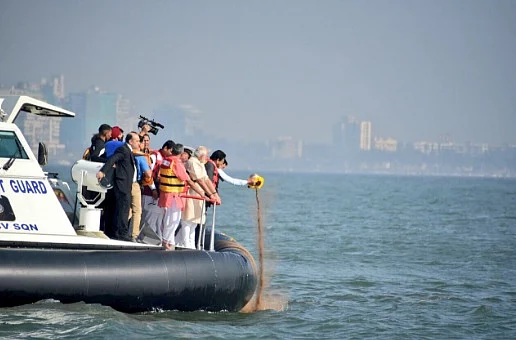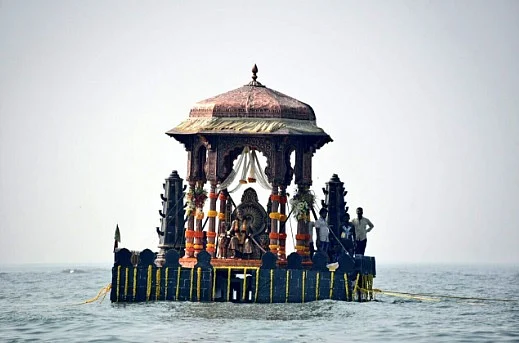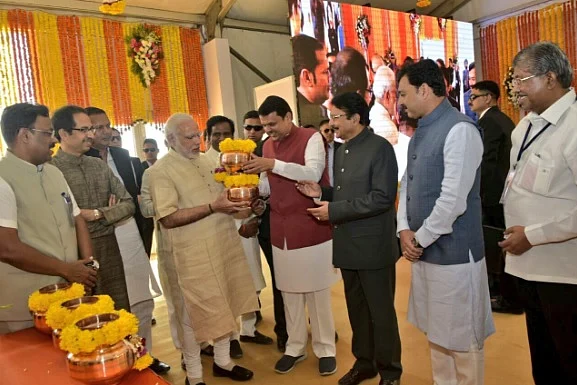(On 3 April 1680, Chhatrapati Shivaji breathed his last at Raigad fort, which is 104 km away from Mumbai. 341 years after his death, the Maratha king continues to dominate the narrative of the politics of Mumbai and Maharashtra.)
“Why can't the government spend money on conserving Shivaji's forts instead of building a new statue of him?”
Many have asked this sensible question on social media. Some have started an online campaign against the extravagant statue. Yet, the Fadnavis government in Maharashtra has decided to ignore all the detractors and go ahead with spending a whopping Rs 3,600 crore on reclaiming land in the Arabian Sea and erecting a statue of Chhatrapati Shivaji on it.
It is interesting to find out why he's so adamant about splurging thousands of crores when Maharashtra is reeling under debt of Rs 3.79 lakh crore – the biggest among all Indian states. What makes Shivaji, a medieval king, the biggest vote magnet in Maharashtra even today? We will go deeper into that question in a little while. But first, let's see why the BJP has gone overboard on this issue.
3 Reasons Why BJP Badly Wants the Statue
- 01/03PM Narendra Modi and other dignitaries in the Arabian Sea for the foundation-laying ceremony of the proposed Shivaji memorial. (Photo Courtesy: Twitter/@CMOMaharashtra)

- 02/03A symbolic, temporary statue made for the function. (Photo Courtesy: Twitter/@CMOMaharashtra)

- 03/03CM Devendra Fadnavis hands over the kalash of water & soil collected from all over Maharashtra to PM Modi as Shiv Sena Chief Uddhav Thackeray and others look on. (Photo Courtesy: Twitter/@CMOMaharashtra)

One, BJP is traditionally seen in Mumbai as a party of Gujarati and Hindi-speakers, while Marathi voters have been voting for the Shiv Sena. If the alliance breaks, BJP will need to woo Marathi voters on its own. And Shivaji is the surest way into Marathi hearts. Remember, Marathi voters form the biggest block (26%) in the financial capital.
Two, apart from Mumbai, nine major cities including Thane, Pune and Nashik are going to polls in a couple of months from now. Thane is ruled by Shiv Sena, Pune by NCP and Nashik by MNS. Marathi and Maratha are both more important issues in all these cities. While Shiv Sena, NCP and Congress promised to build this statue, BJP seems to have completely hijacked it ahead of polls.
Three, Maharashtra recently witnessed historic Maratha rallies, which were anti-government in nature. Fadnavis, a Brahmin by caste, has to placate the 32% of angry Marathas across the state by going to any extreme. Giving them reservation may not be in his hands, but he can definitely give them a sense of pride by putting the Maratha king on the world map.
Why Is Shivaji So Important?
All three points indicate one assumption: that invoking Shivaji ensures Marathi votes. Shivaji was a medieval king who fought against Muslim rulers to establish ‘Hindavi Swarajya’ (Indian or Hindu self-rule). He had the guts to take on the mighty and carve out his kingdom, which eventually became a pan-Indian empire, albeit for a short time.
Marathi people like to believe that the 17th and 18th centuries were the golden age of Maharashtra, when it not only ruled itself, but also the rest of India. When Nehru denied the formation of Maharashtra on the basis of language, a political movement started in Mumbai. It was called the ‘Samyukta Maharashtra Movement’, which demanded an undivided Maharashtra state with Mumbai, Vidarbha and Belgaum (which is in Karnataka).
This movement would eventually change the politics of modern Mumbai and Maharashtra. To keep the movement alive against the oppressions by the Nehru government, Marathi leaders made provocative speeches, which exaggerated the historical deeds of Maratha kings and created an inflated sense of pride. Acharya Atre, a tall leader of the movement, had famously said, ‘My Maharashtra has great history, others have only geography.’
“Samyukta Maharashtra movement saw heightened use of medieval imagery. Later, Bal Thackeray cleverly appropriated and popularised it, when Marathi speakers felt a sense of loss in the cosmopolitan situation in Mumbai. Shiv Sena skilfully compared the material condition of Maharashtrians in Mumbai – who were originally landless peasants – with idealised memory.”Suhas Palshikar, Political Scientist
History Dominates 21st Century Politics
Bal Thackeray, whose father Prabodhankar was an important leader in the Samyukta Maharashtra movement, started a party named after the Maratha king. His oration was full of terminologies and anecdotes from the 17th century. His son Uddhav, who is now the chief of Shiv Sena, continues to ape his father. In his Dussehra rally speech this year, he referred to Shivaji or his period or his phrases at least 15 times in his speech. He was expected to talk about the development of Mumbai, which his party has ruled for almost three decades. Can a medieval mindset help make Mumbai a modern metropolis?
“It’s the vocabulary adopted by some leaders who play the politics of emotion. There exists a mismatch between this communication strategy and serious issues of policy. Maharashtra has legacies of Shivaji Maharaj, Varkari movement and anti-caste movements. While Maharashtrians are proud of these things, they don’t know what to draw from this rich legacy. Then they fall on symbolism or tokenism. They fail in relating these memories to contemporary problems. This limitation is found in all Indian societies. This could have happened as these regional legacies could not be integrated with the national freedom struggle during the 20th century.”Suhas Palshikar, Political Scientist
The symbolism is found everywhere. From airport to railway terminus, you will find Shivaji’s name everywhere in Mumbai and across Maharashtra. Speeches of leaders across party lines are incomplete without singing the praises of the Maratha king and his lieutenants. While there is nothing wrong with drawing inspiration from history, this political game has brainwashed many who begin to idolise it.
“A modern metropolis is about mindsets and ideas, and this is where our leadership fails. The imagery is being used to build identity politics because our leaders can’t fulfil their basic commitment to improve the lives of citizens. Strident rhetoric always has an audience. We are creating a nation of populist demagogues under the influence of vote bank politics.”Rajdeep Sardesai, Senior Journalist
This is not the case with Maharashtra alone. Living in selective, idealised history is found across India and beyond. From MIM in Hyderabad to Mamata in Bengal and from Brexiters in the UK to Donald Trump in the USA, everyone talked about bringing back the glorious past.
So, like BJP promises ‘Ram Rajya’ in the north, now it promises ‘Shiv Rajya’ in Maharashtra. While there is nothing wrong with the promise, the problem is with the enormous cost, which could have been utilised for feeding the tribal children or building dams in drought-hit regions. But as long as voters vote their emotions, politicians will keep diverting the developmental funds to build unnecessary monuments.
(This story was first published on 24 December 2016. It is being reposted from The Quint’s archives to mark his death anniversary.)



